
In the frame of the cooperation between the Sobieski Institute and the Europe Strategy Research Institute, János Matuz, PhD fellow at the Doctoral School of Public Administration at Ludovika University of Public Service and visiting researcher at the Europe Strategy Research Institute, presents a nuanced analysis of Poland’s and Hungary’s contrasting approaches to energy policy and Europe’s competitiveness challenges.
Poland has consistently opposed the Nord Stream pipelines, viewing them as a threat to national security, while Hungary has maintained a neutral stance, respecting Germany's energy decisions within EU sanctions on Russia. According to Matuz, this difference reflects broader strategic priorities, with Poland favoring autonomy and Hungary emphasizing energy security.
Matuz also highlights Europe’s competitiveness crisis, exacerbated by high energy prices and slow productivity growth. Citing Mario Draghi, he notes that Europe’s energy-intensive industries are struggling, widening the economic gap with the US and China, and warns that addressing energy costs is crucial to reversing this trend.
Energy diversification remains a priority for both countries. Poland has diversified its supply with LNG and the Baltic Pipe, while Hungary, being landlocked, relies on gas interconnectors with neighboring countries and aims to expand its nuclear capacity. Both countries are also investing in renewables, although Poland relies more on solid fuels and Hungary on nuclear energy.
In conclusion, Matuz argues that the primary interests of both Poland and Hungary are (i) to expand all their energy networks and their capacities to diversify supply and to increase the security of supply; (ii) to increase the share of renewable energy sources; (iii) to develop their national energy networks; (iv) to develop their nuclear power plants. On these issues, there is a need for a regular exchange of views among decision-makers, experts and academics.
The policy paper is available at the Sobieski Institute' website: